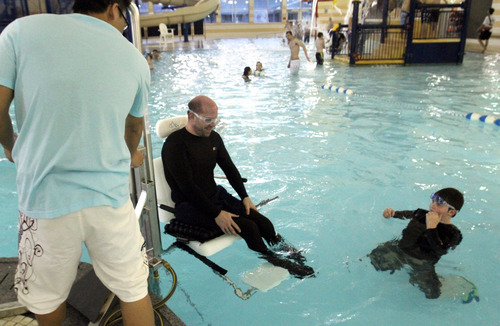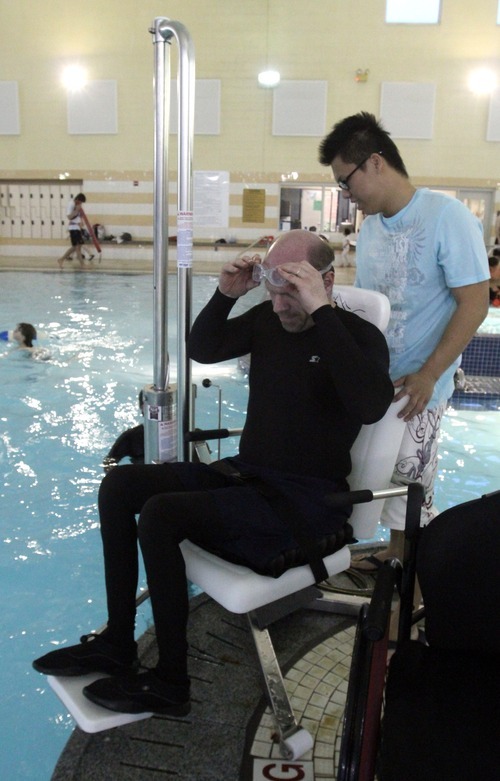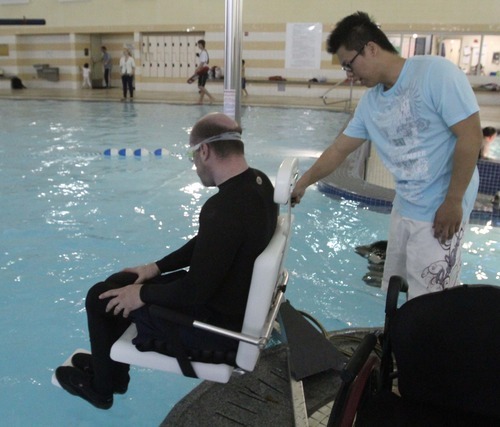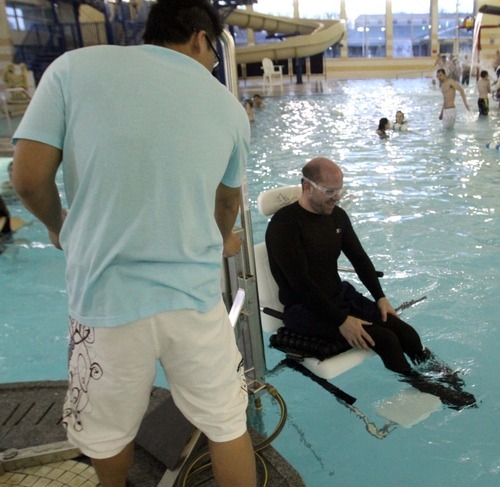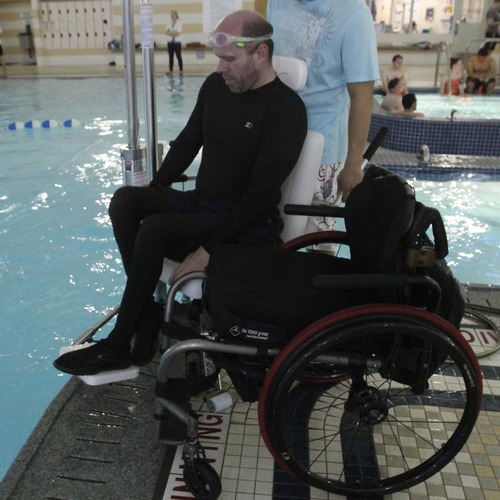This is an archived article that was published on sltrib.com in 2012, and information in the article may be outdated. It is provided only for personal research purposes and may not be reprinted.
Building professionals and business owners, along with all levels of government, are on notice: As of Thursday, your buildings must not have architectural barriers that would hinder people with disabilities from using and enjoying what you have to offer.
Actually, that's been the law for more than 20 years. But in 2010, the U.S. Department of Justice adopted sweeping new design standards to supplant those enacted in 1991, with compliance expected by March 15, 2012.
What's new is a special focus on places for recreation — including all gyms, bowling alleys, boating docks, swimming pools, amusement parks, fitness rooms and golf courses, both full-size and miniature — which were not covered in the original law.
Salt Lake County officials say they are in compliance. "We should be accessible to anybody who shows up" at any of the county's swimming pools, said Wayne Johnson, a Parks and Recreation assistant division director.
At the Holladay Lions pool, people who swim with the University of Utah's Therapeutic Recreation & Independent Lifestyles (TRAILS) program used the pool's new wheelchair lift for the first time Wednesday, said program coordinator Tanja Kari.
In the past, participants needed helpers for a complex transfer from wheelchairs to the pool. The lift will allow them to be more independent.
"That's our whole focus. We do everything out in the community," Kari said. "We are integrated into the core of Utah, doing all the same sports."
It's private businesses that need to be watched, say advocates for disabled people. Think of all the parking lots, front desks, hotel pools, hot tubs and fitness rooms, golf courses, bank night deposit slots, you name it: They must be accessible unless proprietors can convince the Justice Department or courts that changes aren't readily achievable without a high level of difficulty or expense.
It's not enough just to say, "'I can't afford it,'" said Kevin Maher, the ADA expert for the Washington, D.C.-based American Hotel & Lodging Association.
The Americans With Disabilities Act aims to make all of society accessible to people with disabilities. Utah's Disabled Rights Action Committee (DRAC) has prodded restaurants, service stations, banks and the Utah Transit Authority to comply with the law.
In June, DRAC member Barbara Toomer, who uses a wheelchair, sued Wells Fargo banks in Davis County because low concrete barriers made it impossible for her to reach their night depositories. A similar lawsuit against Wells Fargo in Salt Lake County was resolved, and the Davis County case is heading that way, said Salt Lake City civil-rights lawyer Brian Barnard, DRAC's attorney.
Though the Justice Department is responsible for ADA compliance, there are no ADA "police." It's up to individuals to report ADA violations. In Utah, the Disability Law Center and DRAC are willing to intervene and, if necessary, go to court.
Barnard said businesses often have ADA compliance specialists whose contacts are listed on web sites — another good place to lodge complaints. But if nothing is done, "OK, great, I'll sue someone," he said. "The law's been around a long time. These people really shouldn't be warned or told to get in compliance."
Complying is just good business, Maher said. For the past 18 months, he said, his group has mounted an intensive education campaign for its member hoteliers.
"It's a definite deadline. They have to have to have things done or have taken steps toward compliance," Maher said. "I've answered hundreds of calls from members."
Like all businesses, hotels have been required by the ADA to deal with building design and parking lots. The ADA allows "safe harbor" under the 1991 standards for business and government facilities not quite up to date as long as they make required changes when they renovate.
But because recreation facilities weren't included then, there is no safe harbor. They must be accessible.
Pools, for example, must have two means of entry for disabled people. Lifts are the easiest solutions for small pools; larger pools can have sloped entries and grab-bar-equipped access routes called transfer walls.
Maher said his members haven't seen heavy use of accessibility devices, but that probably will change as the boomer generation — more used to getting regular exercise and more used to getting what they want than earlier generations — increasingly experiences limits on mobility.
Steven Carlson, manager of Olympus Hills Lanes in Salt Lake City, said his bowling alley, built in 1964, has been ADA-compliant for 14 years after retrofits to the building entry and bowling lanes with access ramps. While the coffee shop isn't accessible, Carlson said, employees bring food to anyone who orders it lane-side, an acceptable ADA alternative.
Other bowling businesses in the valley, he said, were built to be accessible from the get-go.
That is now required of all new construction. Mary Ann Cowen, Salt Lake County's ADA compliance officer, said the first county building to be constructed under the new rules is the $42.8 million District Attorney's Office on State Street.
Johnson said there will be transfer chairs to help disabled people get into the hot pools at county swim facilities, though they had to fill a wading pool at the Marv Jensen pool in South Jordan with cement because there was no way to make it accessible.
Two county golf courses, Mick Riley and Meadowbrook, make wheelchairs available, Johnson said.
The county has rebuilt park playgrounds with ramps and fibar, the engineered wood chips that people who use wheelchairs can navigate. Draper City went even further: The Draper Riverton Rotary Club raised funds to build Jordan River Rotary Park to exceed ADA requirements for its playground, said Brad Jensen, Draper's parks and trails manager. —
Enforcing the ADA: It's up to you
The Americans with Disabilities Act did not create an enforcement agency. It is up to individuals to make complaints about public places and businesses that lack federally mandated accessibility.
Many businesses and government offices have ADA specialists who can answer questions and take complaints. If further action is needed in Utah, two organizations can help:
Disabled Rights Action Committee > http://www.disabledrightsaction.org or 801-685-8214
Disability Law Center > disabilitylawcenter.org —
Department of Justice lays down federal accessibility law
Changes made in 2010 to the Americans with Disabilities Act of 1990 mean businesses and governments nationwide must comply by Thursday with new standards, including following them in new construction and renovations.
Besides government facilities, privately owned "places of accommodation" such as restaurants, hotels, hospitals, stores, factories and warehouses must comply. Existing businesses must do so as long as the changes are easily accomplished without much difficulty or expense.
Special focus is on recreation facilities including bowling alleys, boating docks, swimming pools, amusement parks, play areas, gyms and fitness rooms.


